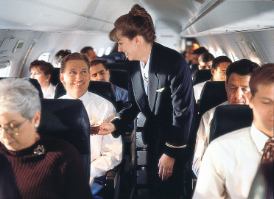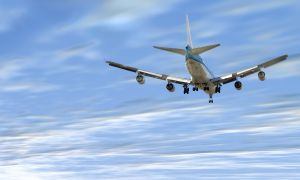Travel News
The Dual Roles of Flight Attendants: Safety Enforcer vs. Flying Waitress
 For the second week in a row, the actions of a flight attendant set off an intense national debate about the conflicting responsibilities of cabin crew members.
For the second week in a row, the actions of a flight attendant set off an intense national debate about the conflicting responsibilities of cabin crew members.
Required to be both in the service industry and law enforcement, flight attendants are torn between serving snacks with a smile and enforcing federal aviation laws.
The delicate balance between enforcer and server was highlighted early this week when a Southwest Airlines flight attendant removed a 13-month-old baby from her mother after witnessing the woman slap the baby for crying.
According to police reports, flight attendant Beverly McCurley observed the mother of the baby open-hand slap the baby in the face in an attempt to quiet the child. McCurley told police that the mother looked agitated and was arguing loudly with her husband.
The child also appeared to have a black eye, which the parents later attributed to a bruise from a dog bite.
Worried for the child’s safety, McCurley stated she took the child from the mother and sat with the child in the back of the plane. The father of the child followed McCurley to the rear of the aircraft, where the flight attendant returned the baby to the father, who sat in the back of the plane with her.
Upon reaching its destination in Albuquerque, New Mexico, the family was met by the local police at the request of the airline. Paramedics checked the child, and the family was questioned before they boarded a connecting flight to continue their trip.
Though many are praising McCurley for neutralizing the situation and looking out for the welfare of the child, the incident has brought attention the role of the flight attendant as an authority figure.
While onboard services continue to erode, the responsibilities of flight attendants have gone up in the post-September 11 era. No longer just about handing out drinks and dinners, flight attendants are now responsible for the safety and well-being of passengers.
However, this dual role makes it difficult to balance being a good host while at the same time policing the people being served. It also leads to misunderstanding with passengers; some who still see cabin crew as waiters in the sky.
 In actuality, federal laws give crew members broad power to ensure the safety of passengers. An unruly passenger who disobeys or interferes with a flight attendant is perpetrating a federal crime, punishable by a $25,000 fine.
In actuality, federal laws give crew members broad power to ensure the safety of passengers. An unruly passenger who disobeys or interferes with a flight attendant is perpetrating a federal crime, punishable by a $25,000 fine.
However, some airline experts say the lack of balance between the “customer is always right” mentality and federal mandates to ensure the safety of the traveling public is leading to flight attendant burnout.
For example, JetBlue flight attendant Steven Slater’s famous meltdown last week was caused in part by a passenger refusing to obey a federal law.
With the service duties of flight attendant being reduced every year, some airline analysts are predicting that one day flight crews might exist solely to keep the peace and enforce the safety rules.
Others experts see the role of flight attendants being eventually split into two teams: one for hospitality and one for enforcement.
Related links on PeterGreenberg.com:
- Flight Attendant Steven Slater – New Folk Hero?
- JetBlue Flight Attendant Snaps Over Abusive Passenger
- Passenger’s Request for OJ Sends Flight Attendant Over the Top
- Revolt on a Plane: If Your Pilot Is Drunk & Other Dangerous Air Travel Scenarios
- Do Airlines Deserve Their Bad Reputation?
By Adriana Padilla at PeterGreenberg.com












